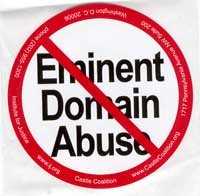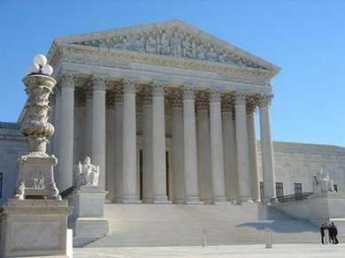Related Topics
Philadelphia Legal Scene
The American legal profession grew up in this town, creating institutions and traditions that set the style for everyone else. Boston, New York and Washington have lots of influential lawyers, but Philadelphia shapes the legal profession.
..Constitution and Court
Forget all those lawyer jokes you hear. The American legal profession can rightly be proud of the Federal Court System, an achievement of the whole profession. America may be legalistic and overlawyered, but that reflects the rule of law dominated by lawyers. Curiously, the leader of this creation, John Marshall, was not so much a legal theoretician as a relentless Federalist lawyer, determined to reshape the legal profession to be worthy of power.
Philadelphia Reflections (6)
New topic 2017-02-06 21:23:28 description
Fees for Trial Lawyers, Section 1983 Variety

|
| Abuse |
We are indebted to Nicholas D'Alessandro, Jr.,Esq. for opening our eyes to the marvels of "1983 cases". That's lawyer slang for Section 1983, Chapter 21 (Civil Rights), Title 42 (The Public Health and Welfare) of the United States Code. In effect, we are talking about a Reconstruction-era law passed in 1871, to protect ex-slaves from persecution by local Southern governments, "acting under color of law". During the entire first century after its enactment, about 270 lawsuits had been brought under this seemingly unobjectionable law.
Well, last year alone there were over 30,000 cases. The number has been steadily growing in the past twenty years, even though it is commonly believed Reconstruction is a best-forgotten episode in a tragic era of the past. Without significant objection, it is generally accepted that the main stimulus for 1983 cases is the recent (and extraordinary) feature of awarding full compensation for legal costs of the plaintiff. In other nuisance lawsuits, the contingent-fee system awards the lawyer a percentage (usually 33%) of the damages, making it unattractive to pursue minor cases. In a 1983 case, however, a trial lawyer could bill $350 an hour for many hours, while pursuing a case worth $100 in damages. A large proportion of these cases allege a local police officer deprived a citizen of his civil rights in the course of arresting him for a traffic violation.
Taken in the aggregate, awarding billions of dollars in fines against local governments can be imagined to represent a punishment of local taxpayers for not reigning in their police officers. They represent a signal from the federal government that it believes local law enforcement is too vigorous in the pursuit of minor infractions and creates an incentive to be less so. Alumni of the Vietnam War protests and other civil disobedience are probably sympathetic if they ever find themselves on juries in such cases.
In recent years, a growing source of 1983 cases have been related to local zoning laws and regulation. Many citizens claim they have been stripped of their property rights when forbidden to put a filling station in their front yard. Others darkly suspect local officials of taking secret bribes to re-sell the property to Wal-Mart, whenever government confronts the owner with taking his property by right of eminent domain. In cases like this, the sympathetic jurors are likely to be Jeffersonians, with a hunting rifle hanging above their fireplace. Such fiercely independent people, however, are given pause by knowing they must appeal the action of local officials to the federal government, acting under a federal law called Section 1983. The frustration must be intensified by learning the U.S. Supreme Court has declared it will not second-guess a local government by granting a writ of certiorari unless the action "offends our conscience". A careful search of the records of the Third Federal District (our own) fails to discover a single instance when that conscience was offended enough to intervene.

|
| Supreme Court |
But, wait. In 2005, the public flamed up. In keeping with past tradition, the Supreme Court again found its conscience was not offended by the exercise of eminent domain by the City of New London, Connecticut. New London is experiencing hard times, potentially made worse by the threatened closure of the nearby submarine base. Accordingly, it seemed in the public interest to condemn some small private properties in order to assemble a large parcel of land for commercial development. Libertarian groups took up the case of Ms. Kelo, a dispossessed small landholder, and carried it to the U. S. Supreme Court, who declared that the eminent domain didn't bother them.
But Kelo v. City of New London did bother a lot of citizens all over the country. Even making allowance for the hostility to the eminent domain which has been growing for decades, and recognizing it is being stirred up by ideological groups, the Supreme Court still had crossed some sort of invisible line. What New London does with its waterfront is of small concern to the rest of the nation, but for the Supreme Court to declare it doesn't really care about such trifles is quite another matter. A man's home has always been referred to as his castle in this country, and title to a great many properties is only completely clear if you acknowledge the power of that gun on the mantelpiece. Add to that the recent extraordinary rise in real estate prices, and you might expect small property holders to be highly resistant to state takings. One must be sympathetic with the dilemma of the judiciary in trying to balance such intense attitudes with the general welfare of the community, particularly a community with floundering economics. But a Supreme Court that can't be bothered with trifles, that don't worry unless you light a fire under them -- had better expect to get fires lit under them.
Originally published: Wednesday, September 01, 2004; most-recently modified: Friday, May 17, 2019